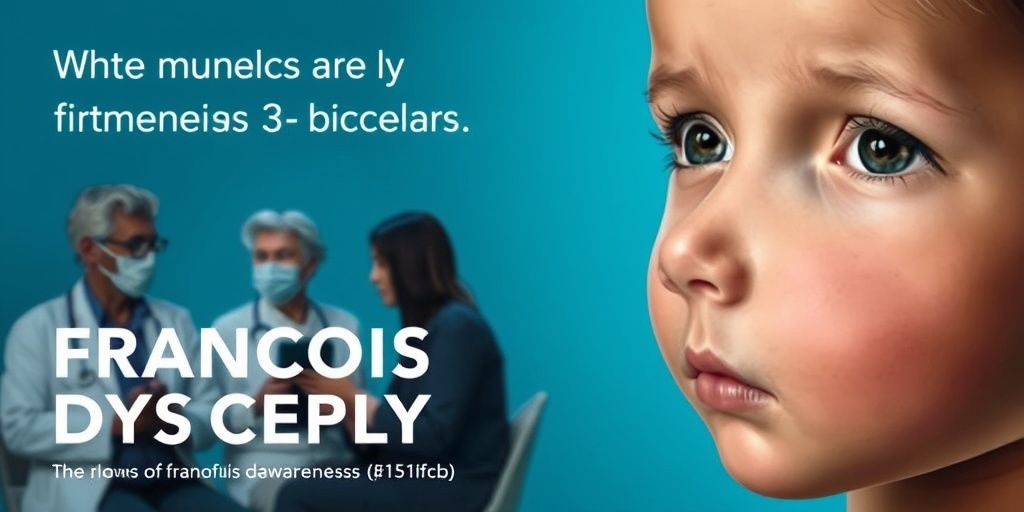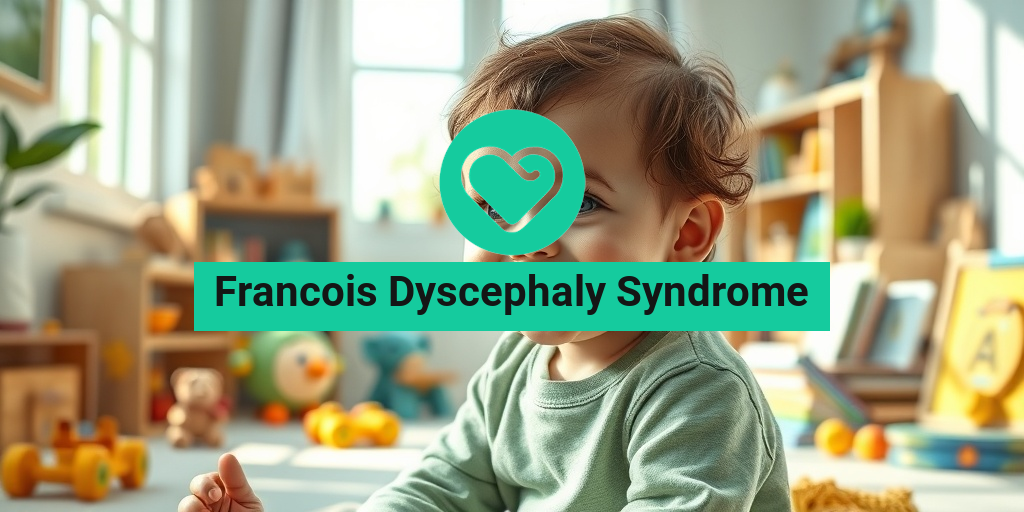What Is Francois Dyscephaly Syndrome?
Francois Dyscephaly Syndrome is a rare genetic disorder characterized by distinct craniofacial abnormalities and neurological challenges. This condition is named after the French physician who first described it, and it primarily affects the development of the brain and skull. Individuals with this syndrome often face a range of health issues that can impact their quality of life.
Understanding the Genetic Basis
The underlying cause of Francois Dyscephaly Syndrome is typically linked to genetic mutations. These mutations can affect the way the body develops during pregnancy, leading to the characteristic features associated with the syndrome. While the exact genetic mechanisms are still being studied, researchers believe that certain genes play a crucial role in craniofacial development.
Prevalence and Diagnosis
Francois Dyscephaly Syndrome is considered extremely rare, with only a limited number of cases reported worldwide. Diagnosis often involves a combination of clinical evaluation and genetic testing. Healthcare professionals look for specific physical traits and may recommend imaging studies to assess brain structure and function.
Francois Dyscephaly Symptoms
Individuals with Francois Dyscephaly Syndrome may exhibit a variety of symptoms, which can vary significantly from one person to another. Understanding these symptoms is crucial for early diagnosis and intervention.
Craniofacial Features
One of the most noticeable aspects of Francois Dyscephaly Syndrome is the distinct craniofacial features. These may include:
- Abnormal head shape: Often, individuals may have an unusually shaped skull, which can be a result of abnormal brain development.
- Facial asymmetry: The face may appear uneven, with one side differing significantly from the other.
- Eye abnormalities: This can include wide-set eyes or other ocular issues that may require further evaluation.
Neurological Challenges
In addition to craniofacial features, individuals with Francois Dyscephaly Syndrome may experience various neurological challenges, such as:
- Developmental delays: Many children with this syndrome may reach developmental milestones later than their peers.
- Learning difficulties: Cognitive challenges can vary, with some individuals requiring special educational support.
- Motor skill issues: Fine and gross motor skills may be affected, leading to difficulties with coordination and movement.
Other Associated Symptoms
Aside from craniofacial and neurological symptoms, individuals may also experience:
- Hearing loss: Some may have auditory processing issues or hearing impairments.
- Behavioral challenges: Anxiety, social difficulties, and other behavioral issues can arise, necessitating psychological support.
- Seizures: In some cases, individuals may experience seizures, which require careful management.
Importance of Early Intervention
Recognizing the symptoms of Francois Dyscephaly Syndrome early on is vital for effective management. Early intervention can significantly improve outcomes, allowing individuals to access necessary therapies and support systems. This may include physical therapy, speech therapy, and educational resources tailored to their unique needs.
For families navigating the complexities of this syndrome, resources like Yesil Health AI can provide valuable, evidence-based health answers. Understanding the condition and its implications can empower families to make informed decisions about care and support.
In conclusion, Francois Dyscephaly Syndrome is a multifaceted condition that requires a comprehensive approach to diagnosis and management. By understanding its symptoms and seeking early intervention, individuals can lead fulfilling lives despite the challenges they may face. 🌟

Causes of Francois Dyscephaly
Francois Dyscephaly Syndrome is a rare neurological condition characterized by distinct craniofacial abnormalities and developmental delays. Understanding the causes of this syndrome is crucial for early diagnosis and intervention. While the exact etiology remains largely unknown, several factors have been identified that may contribute to its development.
Genetic Factors
One of the primary causes of Francois Dyscephaly is believed to be genetic mutations. Research indicates that certain genetic anomalies can disrupt normal brain development, leading to the characteristic features of this syndrome. These mutations may be inherited or occur spontaneously during the formation of the embryo.
Environmental Influences
Environmental factors during pregnancy can also play a significant role in the development of Francois Dyscephaly. Exposure to teratogens—substances that can cause malformation—such as certain medications, alcohol, or infections, may increase the risk of developing this syndrome. Pregnant individuals should be aware of these risks and consult healthcare providers for guidance on safe practices during pregnancy.
Maternal Health Conditions
Maternal health conditions, such as diabetes or obesity, can also contribute to the risk of congenital disorders, including Francois Dyscephaly. Maintaining optimal health before and during pregnancy is essential for reducing the likelihood of developmental issues in the fetus. Regular prenatal care can help monitor and manage these conditions effectively.
Multifactorial Causes
It is important to note that Francois Dyscephaly may arise from a combination of genetic and environmental factors. This multifactorial nature means that while some individuals may have a genetic predisposition, external influences can also significantly impact the outcome. Ongoing research aims to uncover the intricate interplay between these factors to better understand the syndrome.
Risk Factors for Francois Dyscephaly
Identifying risk factors associated with Francois Dyscephaly is vital for early detection and intervention. While the syndrome is rare, certain conditions and behaviors can increase the likelihood of its occurrence.
Family History
A family history of congenital disorders can be a significant risk factor for Francois Dyscephaly. If there are known cases of similar syndromes or genetic conditions in the family, it may warrant further genetic counseling and testing for prospective parents.
Advanced Maternal Age
Women who are of advanced maternal age (typically over 35 years) may face a higher risk of having a child with developmental disorders, including Francois Dyscephaly. This age-related risk is often attributed to the increased likelihood of chromosomal abnormalities during egg formation.
Substance Use During Pregnancy
Substance use, including tobacco, alcohol, and illicit drugs, poses significant risks to fetal development. Pregnant individuals should avoid these substances to minimize the risk of congenital disorders. Education and support for cessation can be beneficial for those struggling with substance use.
Infections During Pregnancy
Certain infections during pregnancy, such as rubella or cytomegalovirus (CMV), can adversely affect fetal development. It is crucial for pregnant individuals to receive appropriate vaccinations and prenatal care to reduce the risk of infections that could lead to Francois Dyscephaly.
Nutrition and Lifestyle Factors
Proper nutrition and a healthy lifestyle are essential for reducing the risk of developmental disorders. A balanced diet rich in vitamins and minerals, along with regular exercise, can support overall health during pregnancy. Additionally, managing stress and ensuring adequate prenatal care can further mitigate risks.
In conclusion, while the exact causes of Francois Dyscephaly remain unclear, understanding the potential genetic and environmental factors can help in identifying at-risk individuals. By recognizing these risk factors, healthcare providers and families can work together to promote healthier pregnancies and improve outcomes for affected children. 🌟

Diagnosis of Francois Dyscephaly Syndrome
Francois Dyscephaly Syndrome is a rare genetic disorder characterized by distinct craniofacial abnormalities and neurological issues. Diagnosing this syndrome can be challenging due to its rarity and the variability of symptoms among affected individuals. Here, we will explore the diagnostic process, including the key signs and tests involved.
Recognizing the Symptoms
The first step in diagnosing Francois Dyscephaly Syndrome is recognizing its symptoms. Common signs include:
- Craniofacial Abnormalities: These may include a prominent forehead, wide-set eyes, and a flat nasal bridge.
- Neurological Issues: Individuals may experience developmental delays, seizures, or motor skill challenges.
- Growth Deficiencies: Many affected children may have growth retardation or other physical development issues.
If a healthcare provider suspects Francois Dyscephaly Syndrome based on these symptoms, they will typically proceed with a series of diagnostic tests.
Genetic Testing
Genetic testing plays a crucial role in confirming a diagnosis of Francois Dyscephaly Syndrome. This may involve:
- Chromosomal Analysis: A karyotype test can identify chromosomal abnormalities that may be associated with the syndrome.
- Next-Generation Sequencing: This advanced technique can detect specific genetic mutations linked to the disorder.
These tests help to establish a definitive diagnosis, allowing for better management of the condition.
Imaging Studies
In addition to genetic testing, imaging studies such as MRI or CT scans may be utilized to assess brain structure and identify any associated neurological anomalies. These imaging techniques can provide valuable insights into the extent of the condition and guide treatment options.
Multidisciplinary Approach
Diagnosing Francois Dyscephaly Syndrome often requires a multidisciplinary approach. Specialists such as geneticists, neurologists, and pediatricians collaborate to evaluate the patient comprehensively. This teamwork ensures that all aspects of the syndrome are considered, leading to a more accurate diagnosis and tailored treatment plan.
Treatment Options for Francois Dyscephaly
While there is currently no cure for Francois Dyscephaly Syndrome, various treatment options can help manage symptoms and improve the quality of life for affected individuals. The treatment plan is typically personalized, depending on the specific symptoms and needs of the patient.
Medical Management
Medical management may include:
- Seizure Control: Antiepileptic medications can be prescribed to manage seizures, a common issue in individuals with this syndrome.
- Physical Therapy: This can help improve motor skills and mobility, addressing developmental delays.
- Speech Therapy: For those experiencing communication difficulties, speech therapy can be beneficial in enhancing language skills.
Surgical Interventions
In some cases, surgical interventions may be necessary to address specific craniofacial abnormalities. These procedures can help improve both function and appearance, significantly impacting the individual’s self-esteem and social interactions.
Supportive Care
Supportive care is essential for individuals with Francois Dyscephaly Syndrome. This may involve:
- Psychological Support: Counseling and support groups can provide emotional assistance for both patients and their families.
- Educational Support: Tailored educational plans can help children with learning difficulties thrive in school settings.
By addressing the various aspects of the syndrome, supportive care can enhance the overall well-being of affected individuals.
Future Directions in Treatment
Research into Francois Dyscephaly Syndrome is ongoing, with scientists exploring potential therapies that target the underlying genetic causes. Advances in gene therapy and personalized medicine may offer hope for more effective treatments in the future. 🌟
In conclusion, while the diagnosis and treatment of Francois Dyscephaly Syndrome can be complex, a comprehensive approach involving medical management, supportive care, and ongoing research can significantly improve the quality of life for those affected. 💖

Living with Francois Dyscephaly
Francois Dyscephaly Syndrome is a rare neurological condition that can significantly impact the lives of those affected. Understanding how to navigate daily life with this syndrome is crucial for patients and their families. This article aims to shed light on the challenges and strategies for living with Francois Dyscephaly.
Understanding the Symptoms
Individuals with Francois Dyscephaly may experience a range of symptoms that can vary in severity. Common symptoms include:
- Motor difficulties: Many patients face challenges with coordination and movement, which can affect their ability to perform everyday tasks.
- Cognitive impairments: Some individuals may experience learning difficulties or delays in cognitive development.
- Speech and language challenges: Communication can be affected, leading to difficulties in expressing thoughts and needs.
- Emotional and behavioral issues: Patients may struggle with anxiety, depression, or behavioral challenges due to their condition.
Daily Life and Coping Strategies
Living with Francois Dyscephaly requires a tailored approach to daily activities. Here are some effective coping strategies:
- Establishing routines: Consistent daily routines can provide structure and predictability, which is beneficial for individuals with cognitive impairments.
- Physical therapy: Engaging in regular physical therapy can help improve motor skills and coordination, making daily tasks easier.
- Speech therapy: Working with a speech therapist can enhance communication skills and boost confidence in social interactions.
- Support groups: Connecting with others who understand the challenges of Francois Dyscephaly can provide emotional support and practical advice.
Creating an Inclusive Environment
Creating a supportive and inclusive environment is essential for individuals with Francois Dyscephaly. Here are some tips for families and caregivers:
- Encourage independence: Allowing individuals to perform tasks independently, even if it takes longer, can foster a sense of accomplishment.
- Adapt the home environment: Making modifications to the home, such as installing grab bars or using adaptive tools, can enhance safety and accessibility.
- Promote social interactions: Encourage participation in social activities to help build friendships and improve social skills.
Future Outlook for Francois Dyscephaly Patients
The future outlook for individuals with Francois Dyscephaly can vary widely based on the severity of symptoms and the effectiveness of interventions. However, advancements in medical research and therapy options are providing hope for improved outcomes.
Medical Advances and Research
Ongoing research into Francois Dyscephaly is crucial for understanding the syndrome better and developing effective treatments. Some promising areas of research include:
- Genetic studies: Understanding the genetic basis of Francois Dyscephaly may lead to targeted therapies and interventions.
- Innovative therapies: New therapeutic approaches, including occupational and behavioral therapies, are being explored to enhance quality of life.
- Assistive technologies: Advances in technology are creating tools that can help individuals with Francois Dyscephaly communicate and interact more effectively.
Empowerment Through Education
Education plays a vital role in empowering individuals with Francois Dyscephaly and their families. By understanding the condition, families can advocate for their loved ones and seek appropriate resources. Here are some educational strategies:
- Workshops and seminars: Attending workshops can provide valuable information about managing symptoms and accessing support services.
- Online resources: Utilizing online platforms and forums can connect families with experts and other families facing similar challenges.
- School support: Collaborating with educators to create an inclusive learning environment can help children with Francois Dyscephaly thrive academically.
In conclusion, while living with Francois Dyscephaly presents unique challenges, understanding the condition and implementing effective strategies can significantly improve the quality of life for patients and their families. With ongoing research and support, the future holds promise for those affected by this syndrome. 🌟

Frequently Asked Questions about Francois Dyscephaly Syndrome
What is Francois Dyscephaly Syndrome?
Francois Dyscephaly Syndrome is a rare genetic disorder characterized by distinct craniofacial abnormalities and neurological issues. It affects the development of the brain and skull, leading to various physical and cognitive challenges.
What are the symptoms of Francois Dyscephaly Syndrome?
- Craniofacial abnormalities
- Neurological impairments
- Developmental delays
- Potential hearing and vision problems
How is Francois Dyscephaly Syndrome diagnosed?
Diagnosis typically involves a combination of physical examinations, imaging studies such as MRI or CT scans, and genetic testing to confirm the presence of specific mutations associated with the syndrome.
What treatments are available for Francois Dyscephaly Syndrome?
While there is no cure for Francois Dyscephaly Syndrome, treatment focuses on managing symptoms and improving quality of life. This may include:
- Physical therapy
- Occupational therapy
- Speech therapy
- Medications for associated conditions
Can Francois Dyscephaly Syndrome be inherited?
Yes, Francois Dyscephaly Syndrome can be inherited in some cases. Genetic counseling is recommended for families with a history of the syndrome to understand the risks and implications for future pregnancies.
What support is available for families affected by Francois Dyscephaly Syndrome?
Families can access various support resources, including:
- Support groups for parents and caregivers
- Educational resources about the syndrome
- Access to specialists in genetics and developmental disorders
Are there any ongoing research efforts related to Francois Dyscephaly Syndrome?
Yes, ongoing research aims to better understand the genetic causes of Francois Dyscephaly Syndrome and to develop potential therapies. Participation in clinical trials may be an option for some families.
Where can I find more information about Francois Dyscephaly Syndrome?
For more information, consider visiting reputable medical websites, genetic disorder organizations, or consulting with healthcare professionals who specialize in genetic conditions.




